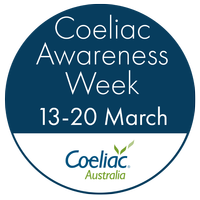What is coeliac disease and who does it affect?
In Australia, 1 in 70 people are diagnosed with coeliac disease; affecting both men and women. Pronounced “see-lee-ac” disease is a hereditary condition where a person’s immune system reacts abnormally to gluten. This immune reaction causes the finger-like projections in the small intestine (villi) to become inflamed and flattened. Damage to the villi results in a decrease in the uptake of essential nutrients. This often causes a person with coeliac disease to develop nutrient deficiencies, and if left untreated, can lead to a number of serious health complications.
What is gluten?
Gluten is a collective term used to describe the grain storage proteins known as ‘prolamins’ found in:
- wheat
- rye
- barley
- spelt
- oats – evidence shows that uncontaminated oats are well tolerated by most people with coeliac disease. However, in some people, oat consumption can trigger a potentially harmful immune response. Check with your dietitian or health care professional if you are unsure.
Gluten acts as the glue that holds the structure of food together, helps bread rise during baking, and gives it that unique chewy texture we all know and love. This property of gluten has lent itself as a useful ingredient in many packaged foods including soy sauce, potato chips, and even beer!
What are the symptoms of coeliac disease?
- Abdominal pain and/or cramping
- Diarrhea or constipation
- Weight loss due to malabsorption of nutrients and even weight gain
- Bloating and gas
- Mouth ulcers
- Nausea and vomiting
- Fatigue
If you have any of these symptoms after consuming gluten, it’s time to seek advice from your doctor or allied health care professional.
Gluten intolerance vs. coeliac disease – what’s the difference?
The symptoms of gluten intolerance are similar to coeliac disease, both will produce symptoms of gas, pain, and bloating, and in both cases, gluten-containing products should be avoided. However, there are a few key differences between the two:
- Coeliac disease causes significant damage to the gut, where gluten intolerance does not; due to a lack of immune response.
- Coeliac disease causes people to be extremely sensitive to gluten, far more than people with a gluten-intolerance.
For example, when a person with coeliac disease prepares a meal with a cooking utensil that has recently touched a food item that contains gluten, this can still cause an extreme reaction.
Dietary recommendations
Coeliac disease cannot be cured, but diagnosed individuals can effectively manage the condition and live a full life by adhering to a strict gluten-free diet. With an increase in awareness of the disease, the food industry has created a variety of delicious gluten-free options for many of our favourite foods.
Food items that are suitable for those on a gluten-free diet:
- Naturally gluten-free foods – for example, fresh fruit and vegetables, fresh meats, eggs, nuts and legumes, milk, fats and oils, and gluten-free grains e.g. rice, quinoa, and corn.
- Products labeled ‘gluten-free’ – you can be confident that products labeled ‘gluten-free’ contain no detectable gluten. One downfall of gluten-free products, however, is that the gluten is often replaced by ingredients higher in sugar and less nutritionally dense. So being mindful of the types of gluten-free products that we consume is essential to ensure we are having a healthy balanced diet. It is also important to avoid cross-contamination by avoiding products with statements such as ‘may contain gluten’.
- Products that use the Coeliac Australia endorsement logo – products displaying the below logo are endorsed by Coeliac Australia and are tested to be suitable for people with coeliac disease.

Top nutrition tips to manage your gluten-free lifestyle
If you have been diagnosed with coeliac disease or considering adopting a gluten-free diet due to sensitivity, here are some other great tips:
- Always read the nutrition label! Although the food may not seem likely to contain gluten itself, there may be traces of it as many packaged products are made in the same factory regardless if they contain gluten or not.
- Easy snack ideas:
– Corn thins and rice crackers are a delicious gluten-free option. Spread with hummus or a slice of cheese for a quick and filling snack!
– Roasted chickpeas
– Carmen’s Protein Bars are not only gluten-free but provide a delicious protein hit and are available at most Coles / Woolworths stores. Plus, they are sure to satisfy your sweet tooth. - Helpful smartphone apps: FoodSwitch is free to download on iOS and Android devices. You simply scan the barcode (using your phone’s camera) within the app to reveal if it’s gluten-free AND provide an alternative product suggestion that is gluten-free. The app also allows you to change the settings to detect foods that are high in fat, salt, and sugar.
- Check your soy! Soy is gluten-free, therefore unflavoured tofu and the majority of soy products are safe and healthy to consume. However, watch out for soy sauce as it does contain gluten; be sure to opt for the gluten-free soy sauce instead. This example emphasises the importance of checking the nutrition labels on your food items!
- Alcohol tips: when consuming alcohol, stay clear of Beer, Ales, Lager, and Stout due to high levels of gluten; gluten-Free beer options are available so opt for those instead.
- Pasta tips: There is a variety of gluten-free pasta now available on your supermarket shelves. For example, Eco Organics Pasta Range; made from chickpeas and brown rice these are healthy and gluten-free pasta alternatives that are packed with plant protein.
- Coeliac Australia is the national registered charity supporting Australians with coeliac disease and associated conditions requiring a gluten-free diet. They have membership options and hold annual Gluten-free expos to highlight all things gluten-free; including education resources, advice, and products!
If you are wanting to learn more about the management of coeliac disease, speaking to a professional like a dietitian is one of the best places to start. For more information book in to see our Dietitian, Jean-Mari.
See reception at your local Club Active or call 1300 258 250 to book in with Jean-Mari.

Jean-Mari enjoys gluten-free cooking and would love to provide healthy gluten-free dietary education and meal ideas.
BURLEIGH, BUNDALL and MURWILLUMBAH // please contact to arrange a time.
TWEED // On-site every Thursday. Contact for an appointment.
PARKWOOD // On-site every Friday. Contact for an appointment.
space space space
space space space
space space space
Author: Munpreet Dillon – Student Dietitian // Edited: Jean-Mari Mouton – Senior Dietitian

